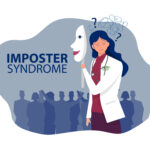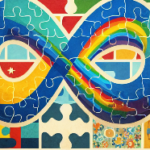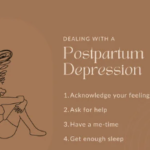When a mother gives birth, there is an excitement and considered to be a fulfilling experience. However, the experience can be different for other women. But what could really be the issue that would make a mother not happy after childbirth? This phase is known as postpartum blues.
A new mother will experience postpartum blues after child birth, these are common since they are just starting their motherhood journey. Some of them could be mood swings, anxiety, income rate, and sleepless nights. If some of these last only a couple of days, it is can still be considered as postpartum blues, but if it’s already taking weeks, there is a sign that it could be postpartum depression.
Anyone with postpartum depression should see it as a medical condition and its treatable. Understanding the signs earlier can help you get treated and manage the symptoms, and you are able to strengthen the bonds with your child.
Signs of Postpartum Blues
There are several signs a new mother new to watch out for to confirm if it’s a postpartum blues or postpartum depression. At least eighty percent of mothers will experience this. But if it’s already getting out of hand or extreme. That’s postpartum depression. Some of the signs of postpartum blues include;
- Mood swing: Mood swing is common among new mothers, especially if it is their first child. Not all the time everyone can be happy. Experiencing mood changes or getting irritated by little things is normal as a new mother.
- Anxiety: Another sign of postpartum blues is anxiety. Feeling worried about the responsibility of motherhood or concerned about how the child would survive. Anxiety can also be worry about the child’s health, feeding, and sleeping pattern.
- Fatigue and Exhaustion: If you get tired quickly or you feel exhausted even after resting, this could be a sign of postpartum blues. It could also be that you are not getting enough rest just because you want to stay awake and watch your child sleep.
- Self-Doubt: Self-doubt can also come after childbirth. A question could pop up like, am I doing the right thing? Questioning your judgment as a mother is also a self-doubt. Self-doubt can also make you think if you are capable to handle motherhood perfectly.
- Overwhelmed: A new mother can also be overwhelmed, thinking about the responsibility of a mother and the things she is expected to do and not to do as a mother. All these could lead to low self-esteem and worry about the ability to be a mother.
- Crying: Not all new mothers can withstand their baby’s cry, especially if they try to calm them down and they are still crying. Emotions happen at times. It’s also possible that a mother can cry without any triggers. They are still expected at least for a few days.
- Change in appetite: This is very common among all new mothers. A change in their eating pattern, either eating less or more. It is considered to be an adjustment to motherhood and doesn’t necessarily need a medical intervention.
Signs of Postpartum Depression
Postpartum depression could differ in terms of intensity and period. They are often extreme compared to postpartum blues. But if you notice some of these signs, there is a possibility you have it.
- Persistent sadness: After giving birth, you notice you’re constantly feeling down or not happy; this is a sign you need to watch out for. Although it is possible to be down at least for a couple of days. If it’s already taking weeks, there is a possibility you have postpartum depression
- Frequent crying: Crying at times as a new mother is normal, but it could get out of hand if it occurs every day. A mother who spends most of her time crying should be checked out; it could be a sign of postpartum depression.
- Staying away from family and friends: As a new mother, the time you should be closer to your family and friends is when you are in your perinatal period. There are things you would need help with after your child’s birth. If you notice it is during this period you move far from them, or you don’t want to see their faces, then it’s most likely you have postpartum depression.
- Depressed mode: Depression could be something that happens once in a while, but if it’s getting to you all the time and you don’t care about things again, this already shows signs that you might have postpartum depression. Most times, what could cause depression as a new mother could be how the child will survive. This is primarily common among single mothers whose income is meager. So, they try to think of what the future might bring for their child.
- Less interest in things you enjoyed before: If you notice that you lose interest in things or activities you usually enjoyed before, there is a tendency for you to have postpartum depression. However, showing just one symptom does not necessarily mean you have postpartum depression. A mother with more than two or three signs listed already is a confirmation you might have it.
- Intense irritation or anger: If you suddenly have strong irritation or you’re angry about little things, friends, or family members. This could be a sign of postpartum depression.
- Thoughts of harming yourself or your baby: Having a thought of harming yourself or your baby is an extreme stage of postpartum depression. If you’re having any of these thoughts, you need to seek medical attention as soon as possible.
Solution for someone with postpartum depression
If you notice anyone in the early stage or extreme stage of postpartum depression, do the following:
- Seek help from medical personnel to discuss your symptoms and provide you with necessary antidepressant medications if necessary.
- Consider therapy. A professional therapist has the necessary strategies and solutions to improve your mental and emotional health.
- Join community, forums, or support groups and connect with other mothers who might have experienced postpartum depression before. When you listen to other mother problems and what they did, they can provide you insights on how you can overcome yours.
Conclusion
Remember, postpartum depression is treatable, and seeking help is a sign of strength, not weakness. With the proper support and attending to it as early as possible, you will enjoy your motherhood journey.



















